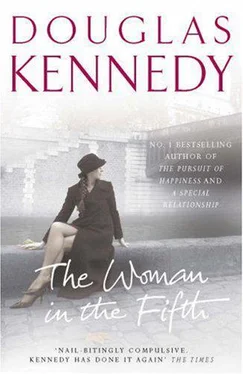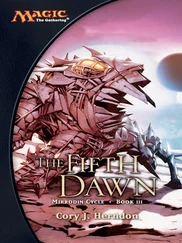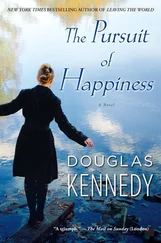‘Go,’ he hissed. ‘38 rue de Paradis.’
He slowed down his gait. But when I tried to stay by him, he hissed again, ‘ Allez rue de Paradis ! ‘
I started walking toward the flics , feeling the same sort of disquiet that comes over me on those rare instances when I have encountered the police or customs officers: an immediate sense that I must be guilty of something.
As I came into their direct line of vision, I could see the flics looking me over, their faces impassive while their eyes took in everything about my appearance. Five feet away from them, I expected the words, ‘ Vos papiers, monsieur .’ But they remained silent as I passed by. I remounted the stairs, then stopped, loitering with intent as I waited in the futile hope that Adnan would follow right behind me. Five minutes passed, then ten. No Adnan. I decided to risk walking downstairs again. If the flics were there, I could plead that I was just a dumb American tourist who had lost his way. But when I reached the corridor again, it was empty.
There was a moment of awful realization: They’ve nabbed him … and it’s all your fault.
This was followed by another awful thought: What do I do now?
Allez rue de Paradis.
Go to Paradise.
PARADISE.
But before I got there, I had to first pass through Africa.
When I emerged from the Chateau d’Eau metro , I was in another Paris. Gone were the big apartment buildings and their well-heeled residents in their expensive casual clothes, loading well-groomed children into their shiny SUVs. Chateau d’Eau was dirty. There was rubbish everywhere. And grubby cafes. And shops that sold cheap synthetic wigs in garish colors like purple. And storefront telephone exchanges, advertising cheap long-distance rates to Cote d’Ivoire, Cameroun, Senegal and the Central African Republic and Burkina Faso and …
I was the only white face in sight. Though the mercury was hovering just above the freezing mark, the boulevard was crowded, with a lot of cafe conversations spilling out on to the street, and people greeting passers-by as if they were in a small village, and merchants selling vegetables or exotic candy from carts. No one eyed me suspiciously. No one gave me a telltale look, saying I had wandered into the wrong corner of town. I was ignored. Even the elderly black man I stopped to ask for directions to the rue de Paradis seemed to look right through me — though he did point up a side street and uttered one phrase, ‘ Vous tournez a droite au fond de la rue ,’ before moving on.
The side street brought me out of Africa and into India. A row of curry houses, and video shops with Bollywood posters in their windows, and more telephone exchanges — only this time the rates were for Mumbai and Delhi and they were also advertised in Hindi. There were also a lot of cheap hotels; giving me a fast, grim alternative for a few nights if the chambre de bonne turned out to be beyond bad, or if this guy Sezer was a trickster and I had walked into some class of set-up.
I had to cross the rue du Faubourg Saint-Denis — a scruffy food market with more cheap shops, brimming with huddled people, their heads down against the cold wind that had started to blow through the streets. I turned right, then took a sharp left into rue de Paradis. At first sight, it looked bland. It was long and narrow — a hodgepodge of characterless nineteenth-century architecture and the occasional modern block. At street level, it seemed dead on arrival — no visible signs of life; just some large wholesale outlets for china and kitchen equipment. Then I began to pass by a place marked Kahve . It was a large, faceless cafe — all fluorescent tubes and gray linoleum and the Istanbul Top Forty blaring on the loudspeaker systems. I peered inside. Men were huddled over tea and talking conspiratorially. A couple of late-morning drunks were asleep at the bar, and a low cloud of cigarette smoke hung over everything. The young, tough-guy bartender turned away from some soccer match on the television to look long and hard at me, wondering why I was loitering with intent outside this establishment. His hostile stare hinted that I should move on.
Which I did.
There were two more kahves on rue de Paradis. There were also a handful of Turkish restaurants and a couple of bars whose shutters were still pulled down at midday. I picked up my pace and stopped examining the street in detail. Instead, I started looking up to check numbers, noting the chipped paintwork on many of the buildings. Number 38 was particularly mangy — its facade blistered with chipped masonry and large yellow blotches, like the ingrained stains on a chain-smoker’s teeth. The front door — a huge, towering object — was also in need of several coats of black gloss. I looked around for some sort of entryphone, but just saw a button marked Porte . I pressed it and heard a telltale click. I had to put my entire weight against it to push it open. I pulled my bag in after me and found myself in a narrow corridor of battered mailboxes and brimming trash cans and a couple of fuse boxes from which loose wires dangled. Up ahead was a courtyard. I walked into it. Off it were three stairways — marked with the letters A, B and C. The courtyard was a small dark rectangle, above which loomed four blocks of apartments. The walls here were as ragged as their exterior counterparts, only now adorned with laundry that draped from windows and makeshift clothes lines. The aroma of greasy cooking and rotting vegetables was omnipresent. So too was a sign that dominated the far side of the courtyard: Sezer Confection (Sezer Ready-to-Wear). There was a separate stairway below this sign. I had to ring a bell to gain admittance. No one answered, so I rang it again. When there was still no answer, I leaned on the bell for a good fifteen seconds. Finally I heard footsteps on the stairs. The door opened and a young tough — dressed in a faded denim jacket with an imitation fur collar — opened the door. His upper lip boasted a meager mustache and he had a cigarette plugged between his teeth. His face radiated annoyance.
‘What you want?’ he asked in bad French.
‘I’m here to see Sezer.’
‘He knows you?’
‘Adnan told me—’
‘Where is Adnan?’ he asked, cutting me off.
‘I’ll explain that to Sezer.’
‘You tell me.’
‘I’d rather tell—’
‘You tell me,’ he said, his tone demonstrative.
‘He was controlled by the flics ,’ I said.
He tensed.
‘When was this?’
‘Less than an hour ago.’
Silence. He looked over my shoulder, scanning the distant corridor. Did he think this was a set-up — and that I had brought ‘company’ with me?
‘You wait here,’ he said and slammed the door in my face.
I stood in the courtyard for the next five minutes, wondering if I should do the sensible thing and make a break for the street before he came back. But what kept me rooted to the spot was the realization that I owed it to Adnan to explain what happened — and to see if Sezer was the sort of connected guy who could pull strings and—
Oh sure. Just look at this back-street set-up. Do you really think the boss here is chummy with the sort of high-up people who will spring an illegal immigrant for him?
All right, what really kept me rooted to the spot was the realization, Right now, I have nowhere else to go … and I needed a cheap place to live.
The door was reopened by Mr Tough Guy. Again, he glanced over my shoulder to make certain the coast was clear before saying, ‘OK, you come upstairs to the office.’
We mounted a narrow staircase. I pulled my suitcase behind me, its wheels landing with an ominous thud on each stair. I’d seen enough film noir to imagine what I was walking into — a dirty smoke-filled office, with a fat slob in a dirty T-shirt behind a cheap metal desk, a drool-sodden cigar in a corner of his mouth, a half-eaten sandwich (with visible teeth marks) in front of him, girlie calendars on the walls, and three lugs in cheap pinstripe suits propping up the background.
Читать дальше












